Unit 5 Amazing things 词句精讲精练(含解析)牛津译林版英语七年级下册
文档属性
| 名称 | Unit 5 Amazing things 词句精讲精练(含解析)牛津译林版英语七年级下册 |
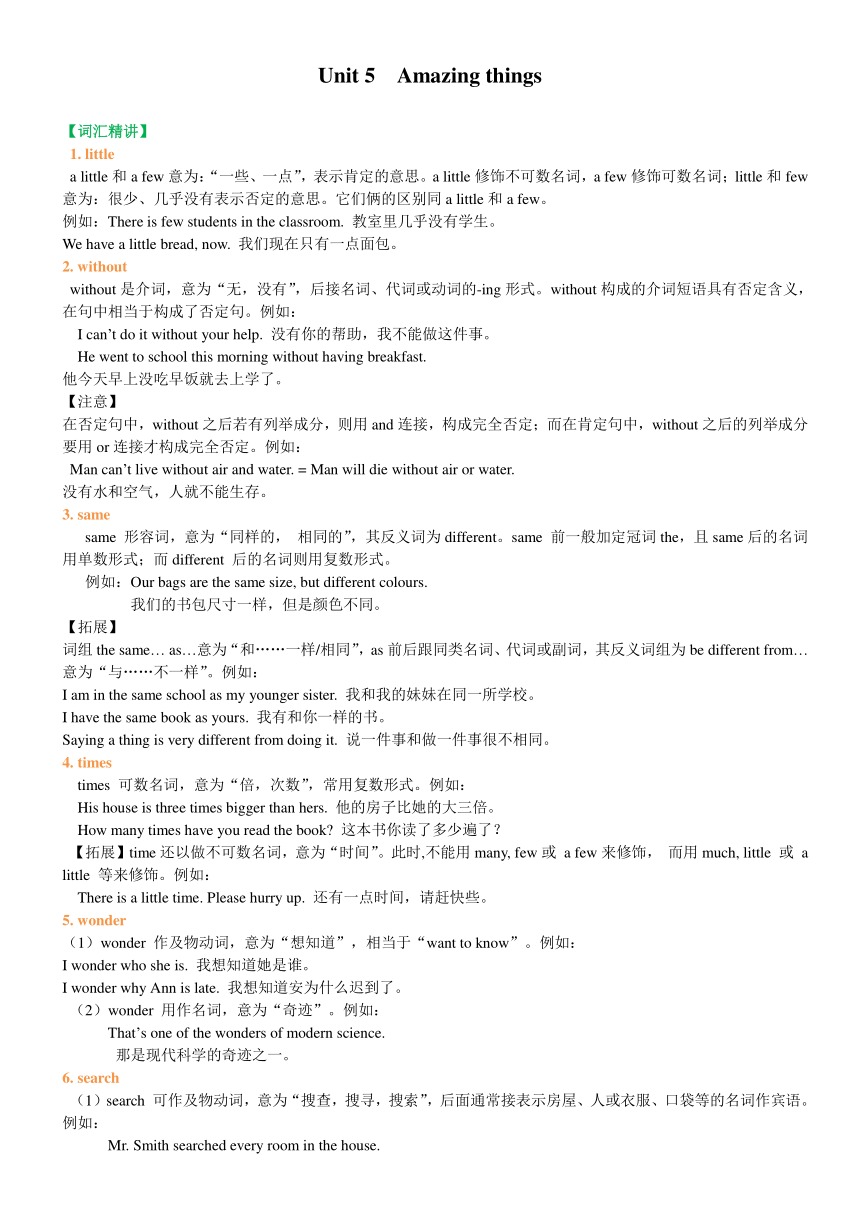
|
|
| 格式 | docx | ||
| 文件大小 | 40.0KB | ||
| 资源类型 | 教案 | ||
| 版本资源 | 牛津译林版 | ||
| 科目 | 英语 | ||
| 更新时间 | 2024-06-16 14:18:56 | ||
图片预览

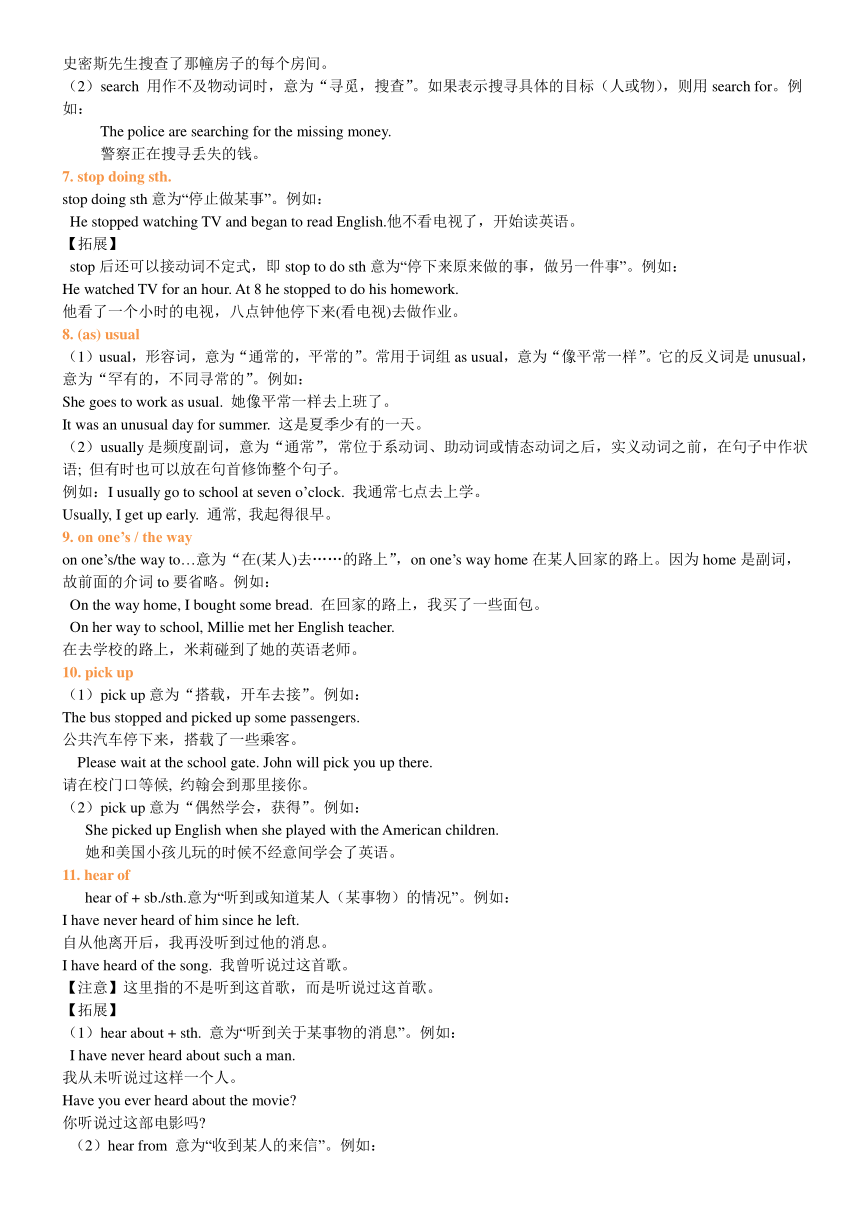
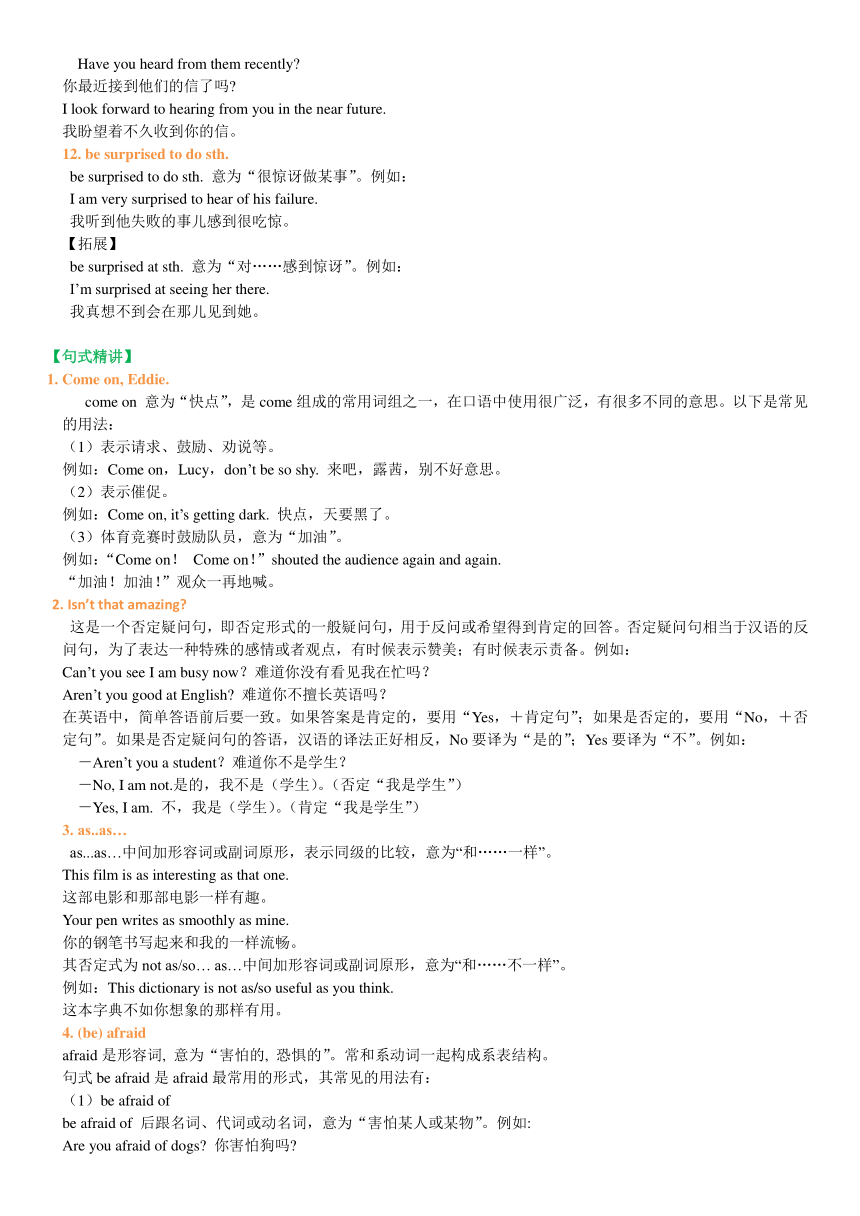
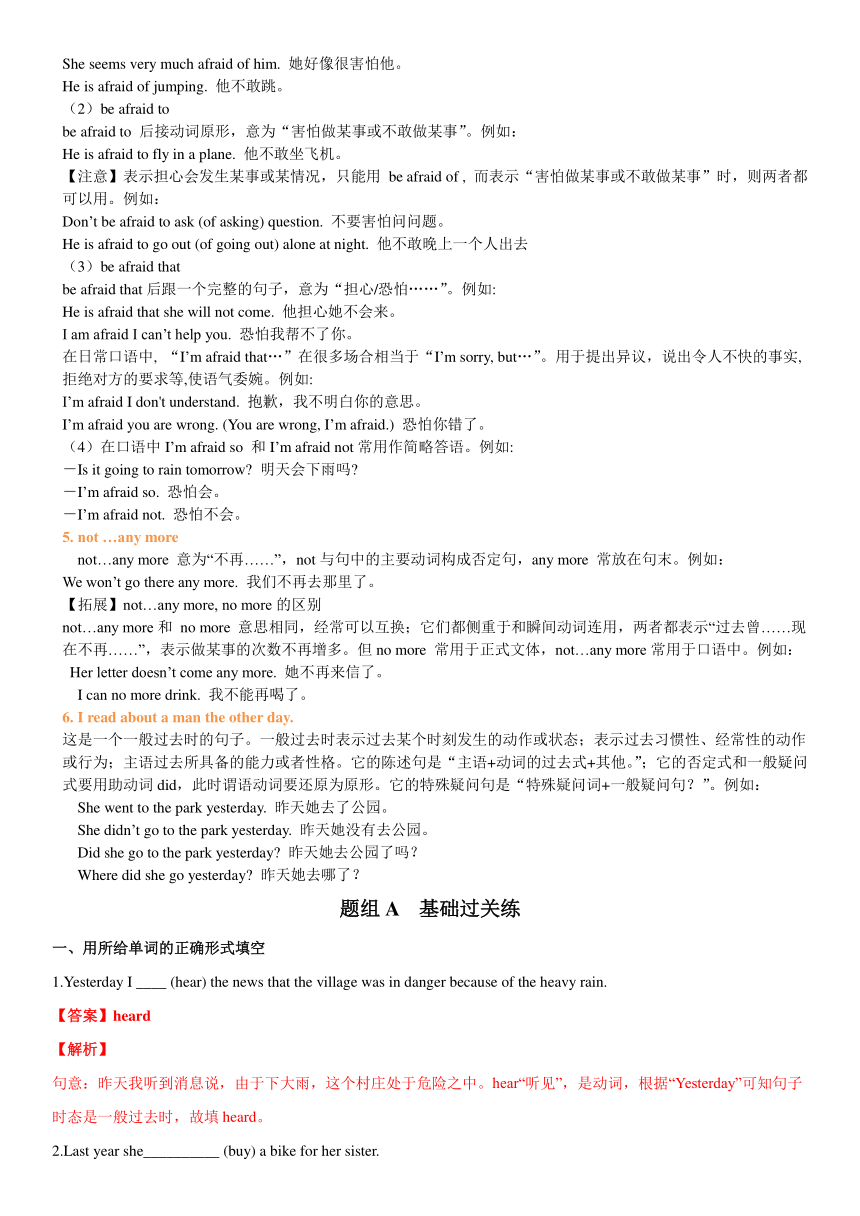
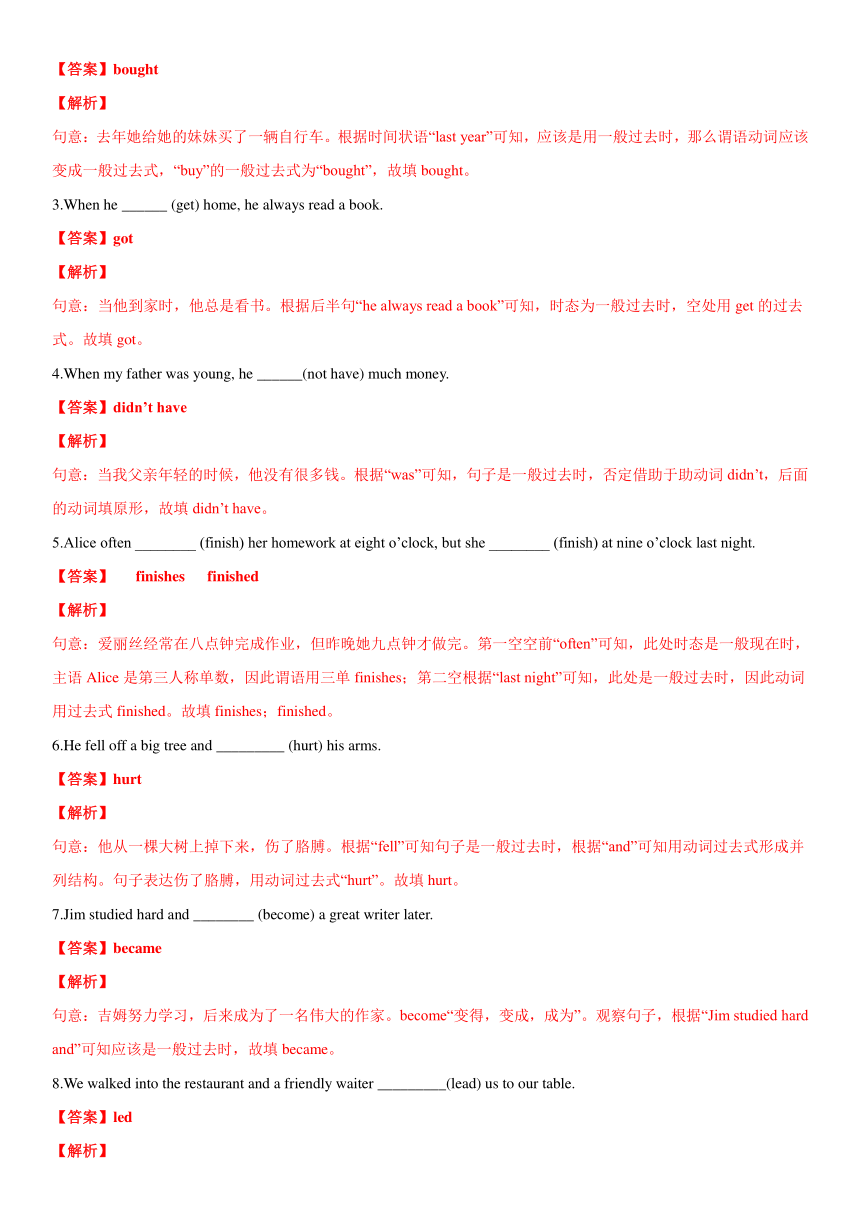
文档简介
Unit 5 Amazing things
【词汇精讲】
1. little
a little和a few意为:“一些、一点”,表示肯定的意思。a little修饰不可数名词,a few修饰可数名词;little和few意为:很少、几乎没有表示否定的意思。它们俩的区别同a little和a few。
例如:There is few students in the classroom. 教室里几乎没有学生。
We have a little bread, now. 我们现在只有一点面包。
2. without
without是介词,意为“无,没有”,后接名词、代词或动词的-ing形式。without构成的介词短语具有否定含义,在句中相当于构成了否定句。例如:
I can’t do it without your help. 没有你的帮助,我不能做这件事。
He went to school this morning without having breakfast.
他今天早上没吃早饭就去上学了。
【注意】
在否定句中,without之后若有列举成分,则用and连接,构成完全否定;而在肯定句中,without之后的列举成分要用or连接才构成完全否定。例如:
Man can’t live without air and water. = Man will die without air or water.
没有水和空气,人就不能生存。
3. same
same 形容词,意为“同样的, 相同的”,其反义词为different。same 前一般加定冠词the,且same后的名词用单数形式;而different 后的名词则用复数形式。
例如:Our bags are the same size, but different colours.
我们的书包尺寸一样,但是颜色不同。
【拓展】
词组the same… as…意为“和……一样/相同”,as前后跟同类名词、代词或副词,其反义词组为be different from…意为“与……不一样”。例如:
I am in the same school as my younger sister. 我和我的妹妹在同一所学校。
I have the same book as yours. 我有和你一样的书。
Saying a thing is very different from doing it. 说一件事和做一件事很不相同。
4. times
times 可数名词,意为“倍,次数”,常用复数形式。例如:
His house is three times bigger than hers. 他的房子比她的大三倍。
How many times have you read the book 这本书你读了多少遍了?
【拓展】time还以做不可数名词,意为“时间”。此时,不能用many, few或 a few来修饰, 而用much, little 或 a little 等来修饰。例如:
There is a little time. Please hurry up. 还有一点时间,请赶快些。
5. wonder
(1)wonder 作及物动词,意为“想知道”,相当于“want to know”。例如:
I wonder who she is. 我想知道她是谁。
I wonder why Ann is late. 我想知道安为什么迟到了。
(2)wonder 用作名词,意为“奇迹”。例如:
That’s one of the wonders of modern science.
那是现代科学的奇迹之一。
6. search
(1)search 可作及物动词,意为“搜查,搜寻,搜索”,后面通常接表示房屋、人或衣服、口袋等的名词作宾语。例如:
Mr. Smith searched every room in the house.
史密斯先生搜查了那幢房子的每个房间。
(2)search 用作不及物动词时,意为“寻觅,搜查”。如果表示搜寻具体的目标(人或物),则用search for。例如:
The police are searching for the missing money.
警察正在搜寻丢失的钱。
7. stop doing sth.
stop doing sth意为“停止做某事”。例如:
He stopped watching TV and began to read English.他不看电视了,开始读英语。
【拓展】
stop后还可以接动词不定式,即stop to do sth意为“停下来原来做的事,做另一件事”。例如:
He watched TV for an hour. At 8 he stopped to do his homework.
他看了一个小时的电视,八点钟他停下来(看电视)去做作业。
8. (as) usual
(1)usual,形容词,意为“通常的,平常的”。常用于词组as usual,意为“像平常一样”。它的反义词是unusual,意为“罕有的,不同寻常的”。例如:
She goes to work as usual. 她像平常一样去上班了。
It was an unusual day for summer. 这是夏季少有的一天。
(2)usually是频度副词,意为“通常”,常位于系动词、助动词或情态动词之后,实义动词之前,在句子中作状语; 但有时也可以放在句首修饰整个句子。
例如:I usually go to school at seven o’clock. 我通常七点去上学。
Usually, I get up early. 通常, 我起得很早。
9. on one’s / the way
on one’s/the way to…意为“在(某人)去……的路上”,on one’s way home在某人回家的路上。因为home是副词,故前面的介词to要省略。例如:
On the way home, I bought some bread. 在回家的路上,我买了一些面包。
On her way to school, Millie met her English teacher.
在去学校的路上,米莉碰到了她的英语老师。
10. pick up
(1)pick up意为“搭载,开车去接”。例如:
The bus stopped and picked up some passengers.
公共汽车停下来,搭载了一些乘客。
Please wait at the school gate. John will pick you up there.
请在校门口等候, 约翰会到那里接你。
(2)pick up意为“偶然学会,获得”。例如:
She picked up English when she played with the American children.
她和美国小孩儿玩的时候不经意间学会了英语。
11. hear of
hear of + sb./sth.意为“听到或知道某人(某事物)的情况”。例如:
I have never heard of him since he left.
自从他离开后,我再没听到过他的消息。
I have heard of the song. 我曾听说过这首歌。
【注意】这里指的不是听到这首歌,而是听说过这首歌。
【拓展】
(1)hear about + sth. 意为“听到关于某事物的消息”。例如:
I have never heard about such a man.
我从未听说过这样一个人。
Have you ever heard about the movie
你听说过这部电影吗
(2)hear from 意为“收到某人的来信”。例如:
Have you heard from them recently
你最近接到他们的信了吗
I look forward to hearing from you in the near future.
我盼望着不久收到你的信。
12. be surprised to do sth.
be surprised to do sth. 意为“很惊讶做某事”。例如:
I am very surprised to hear of his failure.
我听到他失败的事儿感到很吃惊。
【拓展】
be surprised at sth. 意为“对……感到惊讶”。例如:
I’m surprised at seeing her there.
我真想不到会在那儿见到她。
【句式精讲】
1. Come on, Eddie.
come on 意为“快点”,是come组成的常用词组之一,在口语中使用很广泛,有很多不同的意思。以下是常见的用法:
(1)表示请求、鼓励、劝说等。
例如:Come on,Lucy,don’t be so shy. 来吧,露茜,别不好意思。
(2)表示催促。
例如:Come on, it’s getting dark. 快点,天要黑了。
(3)体育竞赛时鼓励队员,意为“加油”。
例如:“Come on! Come on!”shouted the audience again and again.
“加油!加油!”观众一再地喊。
2. Isn’t that amazing
这是一个否定疑问句,即否定形式的一般疑问句,用于反问或希望得到肯定的回答。否定疑问句相当于汉语的反问句,为了表达一种特殊的感情或者观点,有时候表示赞美;有时候表示责备。例如:
Can’t you see I am busy now?难道你没有看见我在忙吗?
Aren’t you good at English 难道你不擅长英语吗?
在英语中,简单答语前后要一致。如果答案是肯定的,要用“Yes,+肯定句”;如果是否定的,要用“No,+否定句”。如果是否定疑问句的答语,汉语的译法正好相反,No要译为“是的”;Yes要译为“不”。例如:
-Aren’t you a student?难道你不是学生?
-No, I am not.是的,我不是(学生)。(否定“我是学生”)
-Yes, I am. 不,我是(学生)。(肯定“我是学生”)
3. as..as…
as...as…中间加形容词或副词原形,表示同级的比较,意为“和……一样”。
This film is as interesting as that one.
这部电影和那部电影一样有趣。
Your pen writes as smoothly as mine.
你的钢笔书写起来和我的一样流畅。
其否定式为not as/so… as…中间加形容词或副词原形,意为“和……不一样”。
例如:This dictionary is not as/so useful as you think.
这本字典不如你想象的那样有用。
4. (be) afraid
afraid是形容词, 意为“害怕的, 恐惧的”。常和系动词一起构成系表结构。
句式be afraid是afraid最常用的形式,其常见的用法有:
(1)be afraid of
be afraid of 后跟名词、代词或动名词,意为“害怕某人或某物”。例如:
Are you afraid of dogs 你害怕狗吗
She seems very much afraid of him. 她好像很害怕他。
He is afraid of jumping. 他不敢跳。
(2)be afraid to
be afraid to 后接动词原形,意为“害怕做某事或不敢做某事”。例如:
He is afraid to fly in a plane. 他不敢坐飞机。
【注意】表示担心会发生某事或某情况,只能用 be afraid of , 而表示“害怕做某事或不敢做某事”时,则两者都可以用。例如:
Don’t be afraid to ask (of asking) question. 不要害怕问问题。
He is afraid to go out (of going out) alone at night. 他不敢晚上一个人出去
(3)be afraid that
be afraid that后跟一个完整的句子,意为“担心/恐怕……”。例如:
He is afraid that she will not come. 他担心她不会来。
I am afraid I can’t help you. 恐怕我帮不了你。
在日常口语中, “I’m afraid that…”在很多场合相当于“I’m sorry, but…”。用于提出异议,说出令人不快的事实,拒绝对方的要求等,使语气委婉。例如:
I’m afraid I don't understand. 抱歉,我不明白你的意思。
I’m afraid you are wrong. (You are wrong, I’m afraid.) 恐怕你错了。
(4)在口语中I’m afraid so 和I’m afraid not常用作简略答语。例如:
-Is it going to rain tomorrow 明天会下雨吗
-I’m afraid so. 恐怕会。
-I’m afraid not. 恐怕不会。
5. not …any more
not…any more 意为“不再……”,not与句中的主要动词构成否定句,any more 常放在句末。例如:
We won’t go there any more. 我们不再去那里了。
【拓展】not…any more, no more的区别
not…any more和 no more 意思相同,经常可以互换;它们都侧重于和瞬间动词连用,两者都表示“过去曾……现在不再……”,表示做某事的次数不再增多。但no more 常用于正式文体,not…any more常用于口语中。例如:
Her letter doesn’t come any more. 她不再来信了。
I can no more drink. 我不能再喝了。
6. I read about a man the other day.
这是一个一般过去时的句子。一般过去时表示过去某个时刻发生的动作或状态;表示过去习惯性、经常性的动作或行为;主语过去所具备的能力或者性格。它的陈述句是“主语+动词的过去式+其他。”;它的否定式和一般疑问式要用助动词did,此时谓语动词要还原为原形。它的特殊疑问句是“特殊疑问词+一般疑问句?”。例如:
She went to the park yesterday. 昨天她去了公园。
She didn’t go to the park yesterday. 昨天她没有去公园。
Did she go to the park yesterday 昨天她去公园了吗?
Where did she go yesterday 昨天她去哪了?
题组A 基础过关练
用所给单词的正确形式填空
1.Yesterday I ____ (hear) the news that the village was in danger because of the heavy rain.
【答案】heard
【解析】
句意:昨天我听到消息说,由于下大雨,这个村庄处于危险之中。hear“听见”,是动词,根据“Yesterday”可知句子时态是一般过去时,故填heard。
2.Last year she__________ (buy) a bike for her sister.
【答案】bought
【解析】
句意:去年她给她的妹妹买了一辆自行车。根据时间状语“last year”可知,应该是用一般过去时,那么谓语动词应该变成一般过去式,“buy”的一般过去式为“bought”,故填bought。
3.When he ______ (get) home, he always read a book.
【答案】got
【解析】
句意:当他到家时,他总是看书。根据后半句“he always read a book”可知,时态为一般过去时,空处用get的过去式。故填got。
4.When my father was young, he ______(not have) much money.
【答案】didn’t have
【解析】
句意:当我父亲年轻的时候,他没有很多钱。根据“was”可知,句子是一般过去时,否定借助于助动词didn’t,后面的动词填原形,故填didn’t have。
5.Alice often ________ (finish) her homework at eight o’clock, but she ________ (finish) at nine o’clock last night.
【答案】 finishes finished
【解析】
句意:爱丽丝经常在八点钟完成作业,但昨晚她九点钟才做完。第一空空前“often”可知,此处时态是一般现在时,主语Alice是第三人称单数,因此谓语用三单finishes;第二空根据“last night”可知,此处是一般过去时,因此动词用过去式finished。故填finishes;finished。
6.He fell off a big tree and _________ (hurt) his arms.
【答案】hurt
【解析】
句意:他从一棵大树上掉下来,伤了胳膊。根据“fell”可知句子是一般过去时,根据“and”可知用动词过去式形成并列结构。句子表达伤了胳膊,用动词过去式“hurt”。故填hurt。
7.Jim studied hard and ________ (become) a great writer later.
【答案】became
【解析】
句意:吉姆努力学习,后来成为了一名伟大的作家。become“变得,变成,成为”。观察句子,根据“Jim studied hard and”可知应该是一般过去时,故填became。
8.We walked into the restaurant and a friendly waiter _________(lead) us to our table.
【答案】led
【解析】
句意:我们走进这家餐馆,一个友好的服务员带着我们到我们的桌子旁。根据“walked”可知句子是一般过去时,谓语动词用过去式。表达“带领,引导”用过去式“led”。故填led。
9.When the bell ________ (ring), Mrs.White came into the classroom.
【答案】rang
【解析】
句意:当铃响时,怀特夫人走进了教室。根据“Mrs.White came into the classroom.”可知,从句的动作也是过去发生的,ring的过去式rang。故填rang。
10.I ________ (lose) my key at school, and I must _____ (find) it.
【答案】 lost find
【解析】
句意:我在学校丢了钥匙,我必须找到它。根据句意语境和英文提示可知,“lose”“丢失”这个动作是过去发生的,应用过去式“lost”;情态动词“must”后接原形动词“find”。故填lost;find。
题组B 能力提升练
完型填空
Mrs. Wilson and Mrs. Smith are sisters. Mrs. Wilson lives in a house in Duncan and Mrs. Smith lives in a flat in Victoria.one day,Mrs. Wilson ___1___ her sister. When her sister answered the door,Mrs. Wilson saw tears (眼泪)in her eyes." What's the matter?"she asked. Mrs. Smith said "My cat Sammy died last night and I have no ___2___ to bury(埋葬)him.”
She began to cry again. Mrs. Wilson was very ___3___ to hear that because she knew her sister loved the cat very much. Suddenly Mrs. Wilson said,"I can bury your cat in ___4___ garden in Duncan and you can come and visit him ___5__,"Mrs. Smith slopped crying and the two sisters had tea together and a nice visit.
It was now five o'clock and Mrs. Wilson said it was time for her to ___6___ .She put on her hat,coat and gloves and Mrs. Smith put the dead Sammy into a shopping bag. Mrs. Wilson took the shopping bag and ___7___ to the bus stop. She waited a long time for the bus,so she bought a ___8___
When the bus arrived,she got on the bus,sat down and put the shopping bag on the ___9___ beside her feet. She then began to read the newspaper again. When the bus arrived at her bus stop,she got off the bus and walked for about two minutes. Suddenly she remembered she ____10____ the shopping bag on the bus.
1.A.visited B.found C.saw D.met
2.A.time B.place C.money D.way
3.A.happy B.grateful C.angry D.sorry
4.A.your B.her C.my D.their
5.A.ever B.sometimes C.never D.before
6.A.go home B.have a rest C.have supper D.cook dinner
7.A.left B.got C.walked D.drove
8.A.newspaper B.book C.magazine D.map
9.A.street B.ground C.bus D.floor
10.A.forgot B.left C.lost D.gave
【答案】1-5 ABDCB 6-10 CCADB
【文章大意】
本文进述了成尔逊夫人把史密斯夫人的猫遗落在公交车上的故事。
【解析】
1.one day,Mrs. Wilson 1 her sister.句意:一天,Mrs. Wilson 来看望她的姐姐。A. visited参观;看望B. found 发现;C. saw 看见;D. met见面。根据下文When her sister answered the door,Mrs. Wilson saw tears (眼泪)in her eyes可知,威尔逊夫人来“拜访”她的妹妹。故选A。
2.句意:我的猫萨米昨晚死了,我没有地方埋葬他。A. time时间;B. place 地方;C. money金钱;D. way方式。根据下文可知,史密斯夫人伤心的原因是没有“地方”埋葬死去的猫。故选B。
3.句意:威尔逊太太听到这个消息非常难过,因为她知道她姐姐非常爱这只猫。A. happy高兴的;B. grateful感激的;C. angry生气的;D. sorry对不起的。听到妹妹的哭诉,威尔逊夫人非常“伤心”。故选D。
4.句意:我可以把你的猫埋在邓肯的花园里,你有时也可以来看望他。A. your你的;B. her她的;C. my我的;D. their他们的。根据Duncan的地点可知,威尔逊夫人说,“我可以把猫埋在我的花园里”。故选C
5.句意:我可以把你的猫埋在邓肯的花园里,你有时也可以来看望他。A. ever曾经;B. sometimes有时候;C. never绝不,从不;D. before在……之前。由于猫埋在威尔逊夫人的花园里,因此史密斯夫人“有时间”可以来看看。故选B。
6.句意:威尔逊说她该吃晚饭了。A. go home回家;B. have a rest休息;C. have supper吃晚饭;D. cook dinner做晚饭。由于5点了,威尔逊夫人该“回家”了。故选C。
7.句意:威尔逊拿起购物袋,走到公共汽车站。A. left离开;B. got得到;C. walked走;D. drove开车。威尔逊夫人“步行”到车站。故选C。
8.句意:所以他买了一份报纸。A. newspaper报纸;B. book书;C. magazine杂志;D. map地图。根据下文“began to read the newspaper”可知,威尔逊夫人买了份报纸。故选A。
9.句意:当公共汽车到达时,她上了公共汽车,坐下来,把购物袋放在她脚边的地板上。A. street街道;B. ground地面;C. bus公共汽车;D. floor地板。根据beside her feet.可知是放在地板上。floor指车厢里的“地板,地面”。故选D
10.句意:突然她想起把购物袋落在公共汽车上了。A. forgot忘记;B. left离开;C. lost失去;D. gave给。“1eave sth. +地点”是固定结构,表示“把某物遗忘在某地”。故选B
题组C 培优拔尖练
阅读理解
A
Little Tommy was doing very badly in math. His parents had tried everything—tutors (家庭教师), cards, special learning centers—in short, everything they could think of. Finally they took Tommy to a catholic (天主教的) school.
After the first day, little Tommy came home with a very serious look on his face. He didn’t kiss his mother hello. Instead, he went straight to his room and started studying. Books and papers were spread (铺开) out all over the room and little Tommy was hard at work. His mother was surprised. She called him down to dinner and as soon as he finished eating, he went back to his room, without a word. In no time he was back hitting the books as hard as before. This went on for some time, day after day while the mother tried to understand what was happening.
Finally, little Tommy brought home his report card. He quietly put it on the table and went up to his room and hit the books. His mom looked at it and to her surprise, little Tommy got an A in math. She could no longer hold her curiosity (好奇心). She went to his room and asked, “Son, what was it Was it the nuns (修女) ”
Little Tommy looked at her and shook his head, “No. ”
“Well then,” she asked again. “WHAT was it ”
Little Tommy looked at her and said, “Well, on the first day of school, when I saw that man nailed (钉) to the plus sign (加号), I knew they weren’t joking.”
1.Why did Tommy’s parents send him to a catholic school
A.Because he could eat well there.
B.Because he could earn more about nuns.
C.Because his parents wanted him to do better in his math.
D.Because his parents didn’t want him to learn math any more.
2.Tommy’s mother felt surprised that his son _______.
A.was still the same as usual B.ate so much at dinner
C.kissed her hello after school D.worked hard but said little
3.“Hitting the books” means “_______” in Chinese.
A.用功 B.捶书 C.发泄 D.振作
4.The last sentence in the passage shows that _______.
A.Tommy felt sorry for the mail B.Tommy was afraid of being nailed
C.Tommy didn’t like the plus sign D.Tommy liked playing jokes on others
5.From the passage, we can infer (推断) that _______.
A.teachers should be strict with their students
B.mistaking (误解) might do good sometimes
C.a catholic school is much better than other ones
D.nuns are good at helping children with their math
【答案】CDABB
【文章大意】
短文讲述了Tommy数学学习不好,其父母想尽一切方法都不奏效,最后将他送进了一所天主教的教会学校。因为害怕不用功学习会被钉在十字架上,所以他一改自己原来不好的学习习惯,很快数学成绩有了提高。
【解析】
1.细节理解题,根据“Little Tommy was doing very badly in math.”可知,Tommy的父母送他去天主教学校是因为父母想让他在数学方面更好,故选C。
2.细节理解题,根据“Instead, he went straight to his room and started studying. Books and papers were spread (铺开) out all over the room and little Tommy was hard at work. His mother was surprised. She called him down to dinner and as soon as he finished eating, he went back to his room, without a word.”可知,Tommy的妈妈感觉很惊讶,他的儿子学习努力但几乎不说话,故选D。
3.词句猜测题,根据“Books and papers were spread (铺开) out all over the room and little Tommy was hard at work.”和“In no time he was back hitting the books as hard as before.”可知,Tommy将书本展开满屋并努力学习起来,他一吃完饭就一言不发地回到自己房间,又像以前那样拼命地读书了。从这里可以看出 “Hitting the books”应该是努力用功的意思,故选A。
4.推理判断题,根据“Well, on the first day of school, when I saw that man nailed (钉) to the plus sign (加号), I knew they weren’t jokng.”,和上下文可知,短文最后一句话表明害怕被钉在十字架上,故选B。
5.推理判断题,根据“Well, on the first day of school, when I saw that man nailed (钉) to the plus sign (加号), I knew they weren’t joking.”及文章大意可知,Tommy对这所天主教的教会学校产生了误解,正是这误解导致了他最后学好了数学,所以误解有的时候也是好事,故选B。
B
A teacher was asking a student a lot of questions, but the student couldn’t answer any of them. The teacher then decided to ask him some very easy questions so that he could get some right answers.
“What was Bunker Hill ” she said. The student thought for some time and then answered, “An airport(机场)?”
“No, it was a battle(战斗),” the teacher said. She was a little annoyed now, but she was trying not to show it. Then she asked, “Who was the first President(总统)of the United States ”
The student thought for a long time, but didn’t say anything. Then the teacher got much angrier and shouted, “George Washington!” The student got up and began to walk to his seat.
“Come back!” the teacher said. “I didn’t tell you to go.”
“Oh, I’m sorry,” the student said. “I thought you called the next student.”
6.Why did the teacher then decide to ask him some very easy questions Because ________.
A.the student couldn’t answer all of them
B.the teacher liked to ask easy questions
C.the teacher wanted him to get some right answers
D.the student didn’t think for a long time
7.What was Bunker Hill It’s ______.
A.an airport
B.the first President
C.a battle
D.the next student’s name
8.The word “annoyed” is “______”.
A.surprised B.afraid
C.happy D.angry
9.Why did the student say nothing when he was asked again Because he ________.
A.didn’t know about it
B.got angry, too
C.didn’t want to say anything
D.wanted to go back
10.From the story we can know ______.
A.the student in the passage studied very hard
B.the teacher liked the student very much
C.the student was very bad at history
D.the student was very popular at his school
【答案】CCDAC
【文章大意】
这篇短文讲述的是在一节课上,老师问某一个学生问题,但他都答不出来。于是老师问他一些比较简单的问题,但这个学生还是回答不出来,还闹出了一个笑话。
【解析】
6.细节理解题。根据文中“so that he could get some right answers”可知,老师问学生一些非常简单的问题是为了让他得到正确回答。故选C。
7.细节理解题。根据文中“No,it was a battle”可知,Bunker Hill是一次战役。由此可知应选C。
8.词义猜测题。根据这个学生回答不出一个极为简单的问题,及下文中Then the teacher got much angrier“老师变得更加生气了”可知,annoyed的意思是“生气的”。故选D。
9.推理判断题。根据下文“Oh, I’m sorry,” the student said. “I thought you called the next student.”
可知,这位学生不知道乔治 华盛顿是美国第一任总统,因此他什么也没说的原因是他不知道答案。故选A。
10.推理判断题。老师问的两个问题均与历史知识有关,而该学生一个问题都回答不出来。由此可知,该生历史知识很差。故选C。
【词汇精讲】
1. little
a little和a few意为:“一些、一点”,表示肯定的意思。a little修饰不可数名词,a few修饰可数名词;little和few意为:很少、几乎没有表示否定的意思。它们俩的区别同a little和a few。
例如:There is few students in the classroom. 教室里几乎没有学生。
We have a little bread, now. 我们现在只有一点面包。
2. without
without是介词,意为“无,没有”,后接名词、代词或动词的-ing形式。without构成的介词短语具有否定含义,在句中相当于构成了否定句。例如:
I can’t do it without your help. 没有你的帮助,我不能做这件事。
He went to school this morning without having breakfast.
他今天早上没吃早饭就去上学了。
【注意】
在否定句中,without之后若有列举成分,则用and连接,构成完全否定;而在肯定句中,without之后的列举成分要用or连接才构成完全否定。例如:
Man can’t live without air and water. = Man will die without air or water.
没有水和空气,人就不能生存。
3. same
same 形容词,意为“同样的, 相同的”,其反义词为different。same 前一般加定冠词the,且same后的名词用单数形式;而different 后的名词则用复数形式。
例如:Our bags are the same size, but different colours.
我们的书包尺寸一样,但是颜色不同。
【拓展】
词组the same… as…意为“和……一样/相同”,as前后跟同类名词、代词或副词,其反义词组为be different from…意为“与……不一样”。例如:
I am in the same school as my younger sister. 我和我的妹妹在同一所学校。
I have the same book as yours. 我有和你一样的书。
Saying a thing is very different from doing it. 说一件事和做一件事很不相同。
4. times
times 可数名词,意为“倍,次数”,常用复数形式。例如:
His house is three times bigger than hers. 他的房子比她的大三倍。
How many times have you read the book 这本书你读了多少遍了?
【拓展】time还以做不可数名词,意为“时间”。此时,不能用many, few或 a few来修饰, 而用much, little 或 a little 等来修饰。例如:
There is a little time. Please hurry up. 还有一点时间,请赶快些。
5. wonder
(1)wonder 作及物动词,意为“想知道”,相当于“want to know”。例如:
I wonder who she is. 我想知道她是谁。
I wonder why Ann is late. 我想知道安为什么迟到了。
(2)wonder 用作名词,意为“奇迹”。例如:
That’s one of the wonders of modern science.
那是现代科学的奇迹之一。
6. search
(1)search 可作及物动词,意为“搜查,搜寻,搜索”,后面通常接表示房屋、人或衣服、口袋等的名词作宾语。例如:
Mr. Smith searched every room in the house.
史密斯先生搜查了那幢房子的每个房间。
(2)search 用作不及物动词时,意为“寻觅,搜查”。如果表示搜寻具体的目标(人或物),则用search for。例如:
The police are searching for the missing money.
警察正在搜寻丢失的钱。
7. stop doing sth.
stop doing sth意为“停止做某事”。例如:
He stopped watching TV and began to read English.他不看电视了,开始读英语。
【拓展】
stop后还可以接动词不定式,即stop to do sth意为“停下来原来做的事,做另一件事”。例如:
He watched TV for an hour. At 8 he stopped to do his homework.
他看了一个小时的电视,八点钟他停下来(看电视)去做作业。
8. (as) usual
(1)usual,形容词,意为“通常的,平常的”。常用于词组as usual,意为“像平常一样”。它的反义词是unusual,意为“罕有的,不同寻常的”。例如:
She goes to work as usual. 她像平常一样去上班了。
It was an unusual day for summer. 这是夏季少有的一天。
(2)usually是频度副词,意为“通常”,常位于系动词、助动词或情态动词之后,实义动词之前,在句子中作状语; 但有时也可以放在句首修饰整个句子。
例如:I usually go to school at seven o’clock. 我通常七点去上学。
Usually, I get up early. 通常, 我起得很早。
9. on one’s / the way
on one’s/the way to…意为“在(某人)去……的路上”,on one’s way home在某人回家的路上。因为home是副词,故前面的介词to要省略。例如:
On the way home, I bought some bread. 在回家的路上,我买了一些面包。
On her way to school, Millie met her English teacher.
在去学校的路上,米莉碰到了她的英语老师。
10. pick up
(1)pick up意为“搭载,开车去接”。例如:
The bus stopped and picked up some passengers.
公共汽车停下来,搭载了一些乘客。
Please wait at the school gate. John will pick you up there.
请在校门口等候, 约翰会到那里接你。
(2)pick up意为“偶然学会,获得”。例如:
She picked up English when she played with the American children.
她和美国小孩儿玩的时候不经意间学会了英语。
11. hear of
hear of + sb./sth.意为“听到或知道某人(某事物)的情况”。例如:
I have never heard of him since he left.
自从他离开后,我再没听到过他的消息。
I have heard of the song. 我曾听说过这首歌。
【注意】这里指的不是听到这首歌,而是听说过这首歌。
【拓展】
(1)hear about + sth. 意为“听到关于某事物的消息”。例如:
I have never heard about such a man.
我从未听说过这样一个人。
Have you ever heard about the movie
你听说过这部电影吗
(2)hear from 意为“收到某人的来信”。例如:
Have you heard from them recently
你最近接到他们的信了吗
I look forward to hearing from you in the near future.
我盼望着不久收到你的信。
12. be surprised to do sth.
be surprised to do sth. 意为“很惊讶做某事”。例如:
I am very surprised to hear of his failure.
我听到他失败的事儿感到很吃惊。
【拓展】
be surprised at sth. 意为“对……感到惊讶”。例如:
I’m surprised at seeing her there.
我真想不到会在那儿见到她。
【句式精讲】
1. Come on, Eddie.
come on 意为“快点”,是come组成的常用词组之一,在口语中使用很广泛,有很多不同的意思。以下是常见的用法:
(1)表示请求、鼓励、劝说等。
例如:Come on,Lucy,don’t be so shy. 来吧,露茜,别不好意思。
(2)表示催促。
例如:Come on, it’s getting dark. 快点,天要黑了。
(3)体育竞赛时鼓励队员,意为“加油”。
例如:“Come on! Come on!”shouted the audience again and again.
“加油!加油!”观众一再地喊。
2. Isn’t that amazing
这是一个否定疑问句,即否定形式的一般疑问句,用于反问或希望得到肯定的回答。否定疑问句相当于汉语的反问句,为了表达一种特殊的感情或者观点,有时候表示赞美;有时候表示责备。例如:
Can’t you see I am busy now?难道你没有看见我在忙吗?
Aren’t you good at English 难道你不擅长英语吗?
在英语中,简单答语前后要一致。如果答案是肯定的,要用“Yes,+肯定句”;如果是否定的,要用“No,+否定句”。如果是否定疑问句的答语,汉语的译法正好相反,No要译为“是的”;Yes要译为“不”。例如:
-Aren’t you a student?难道你不是学生?
-No, I am not.是的,我不是(学生)。(否定“我是学生”)
-Yes, I am. 不,我是(学生)。(肯定“我是学生”)
3. as..as…
as...as…中间加形容词或副词原形,表示同级的比较,意为“和……一样”。
This film is as interesting as that one.
这部电影和那部电影一样有趣。
Your pen writes as smoothly as mine.
你的钢笔书写起来和我的一样流畅。
其否定式为not as/so… as…中间加形容词或副词原形,意为“和……不一样”。
例如:This dictionary is not as/so useful as you think.
这本字典不如你想象的那样有用。
4. (be) afraid
afraid是形容词, 意为“害怕的, 恐惧的”。常和系动词一起构成系表结构。
句式be afraid是afraid最常用的形式,其常见的用法有:
(1)be afraid of
be afraid of 后跟名词、代词或动名词,意为“害怕某人或某物”。例如:
Are you afraid of dogs 你害怕狗吗
She seems very much afraid of him. 她好像很害怕他。
He is afraid of jumping. 他不敢跳。
(2)be afraid to
be afraid to 后接动词原形,意为“害怕做某事或不敢做某事”。例如:
He is afraid to fly in a plane. 他不敢坐飞机。
【注意】表示担心会发生某事或某情况,只能用 be afraid of , 而表示“害怕做某事或不敢做某事”时,则两者都可以用。例如:
Don’t be afraid to ask (of asking) question. 不要害怕问问题。
He is afraid to go out (of going out) alone at night. 他不敢晚上一个人出去
(3)be afraid that
be afraid that后跟一个完整的句子,意为“担心/恐怕……”。例如:
He is afraid that she will not come. 他担心她不会来。
I am afraid I can’t help you. 恐怕我帮不了你。
在日常口语中, “I’m afraid that…”在很多场合相当于“I’m sorry, but…”。用于提出异议,说出令人不快的事实,拒绝对方的要求等,使语气委婉。例如:
I’m afraid I don't understand. 抱歉,我不明白你的意思。
I’m afraid you are wrong. (You are wrong, I’m afraid.) 恐怕你错了。
(4)在口语中I’m afraid so 和I’m afraid not常用作简略答语。例如:
-Is it going to rain tomorrow 明天会下雨吗
-I’m afraid so. 恐怕会。
-I’m afraid not. 恐怕不会。
5. not …any more
not…any more 意为“不再……”,not与句中的主要动词构成否定句,any more 常放在句末。例如:
We won’t go there any more. 我们不再去那里了。
【拓展】not…any more, no more的区别
not…any more和 no more 意思相同,经常可以互换;它们都侧重于和瞬间动词连用,两者都表示“过去曾……现在不再……”,表示做某事的次数不再增多。但no more 常用于正式文体,not…any more常用于口语中。例如:
Her letter doesn’t come any more. 她不再来信了。
I can no more drink. 我不能再喝了。
6. I read about a man the other day.
这是一个一般过去时的句子。一般过去时表示过去某个时刻发生的动作或状态;表示过去习惯性、经常性的动作或行为;主语过去所具备的能力或者性格。它的陈述句是“主语+动词的过去式+其他。”;它的否定式和一般疑问式要用助动词did,此时谓语动词要还原为原形。它的特殊疑问句是“特殊疑问词+一般疑问句?”。例如:
She went to the park yesterday. 昨天她去了公园。
She didn’t go to the park yesterday. 昨天她没有去公园。
Did she go to the park yesterday 昨天她去公园了吗?
Where did she go yesterday 昨天她去哪了?
题组A 基础过关练
用所给单词的正确形式填空
1.Yesterday I ____ (hear) the news that the village was in danger because of the heavy rain.
【答案】heard
【解析】
句意:昨天我听到消息说,由于下大雨,这个村庄处于危险之中。hear“听见”,是动词,根据“Yesterday”可知句子时态是一般过去时,故填heard。
2.Last year she__________ (buy) a bike for her sister.
【答案】bought
【解析】
句意:去年她给她的妹妹买了一辆自行车。根据时间状语“last year”可知,应该是用一般过去时,那么谓语动词应该变成一般过去式,“buy”的一般过去式为“bought”,故填bought。
3.When he ______ (get) home, he always read a book.
【答案】got
【解析】
句意:当他到家时,他总是看书。根据后半句“he always read a book”可知,时态为一般过去时,空处用get的过去式。故填got。
4.When my father was young, he ______(not have) much money.
【答案】didn’t have
【解析】
句意:当我父亲年轻的时候,他没有很多钱。根据“was”可知,句子是一般过去时,否定借助于助动词didn’t,后面的动词填原形,故填didn’t have。
5.Alice often ________ (finish) her homework at eight o’clock, but she ________ (finish) at nine o’clock last night.
【答案】 finishes finished
【解析】
句意:爱丽丝经常在八点钟完成作业,但昨晚她九点钟才做完。第一空空前“often”可知,此处时态是一般现在时,主语Alice是第三人称单数,因此谓语用三单finishes;第二空根据“last night”可知,此处是一般过去时,因此动词用过去式finished。故填finishes;finished。
6.He fell off a big tree and _________ (hurt) his arms.
【答案】hurt
【解析】
句意:他从一棵大树上掉下来,伤了胳膊。根据“fell”可知句子是一般过去时,根据“and”可知用动词过去式形成并列结构。句子表达伤了胳膊,用动词过去式“hurt”。故填hurt。
7.Jim studied hard and ________ (become) a great writer later.
【答案】became
【解析】
句意:吉姆努力学习,后来成为了一名伟大的作家。become“变得,变成,成为”。观察句子,根据“Jim studied hard and”可知应该是一般过去时,故填became。
8.We walked into the restaurant and a friendly waiter _________(lead) us to our table.
【答案】led
【解析】
句意:我们走进这家餐馆,一个友好的服务员带着我们到我们的桌子旁。根据“walked”可知句子是一般过去时,谓语动词用过去式。表达“带领,引导”用过去式“led”。故填led。
9.When the bell ________ (ring), Mrs.White came into the classroom.
【答案】rang
【解析】
句意:当铃响时,怀特夫人走进了教室。根据“Mrs.White came into the classroom.”可知,从句的动作也是过去发生的,ring的过去式rang。故填rang。
10.I ________ (lose) my key at school, and I must _____ (find) it.
【答案】 lost find
【解析】
句意:我在学校丢了钥匙,我必须找到它。根据句意语境和英文提示可知,“lose”“丢失”这个动作是过去发生的,应用过去式“lost”;情态动词“must”后接原形动词“find”。故填lost;find。
题组B 能力提升练
完型填空
Mrs. Wilson and Mrs. Smith are sisters. Mrs. Wilson lives in a house in Duncan and Mrs. Smith lives in a flat in Victoria.one day,Mrs. Wilson ___1___ her sister. When her sister answered the door,Mrs. Wilson saw tears (眼泪)in her eyes." What's the matter?"she asked. Mrs. Smith said "My cat Sammy died last night and I have no ___2___ to bury(埋葬)him.”
She began to cry again. Mrs. Wilson was very ___3___ to hear that because she knew her sister loved the cat very much. Suddenly Mrs. Wilson said,"I can bury your cat in ___4___ garden in Duncan and you can come and visit him ___5__,"Mrs. Smith slopped crying and the two sisters had tea together and a nice visit.
It was now five o'clock and Mrs. Wilson said it was time for her to ___6___ .She put on her hat,coat and gloves and Mrs. Smith put the dead Sammy into a shopping bag. Mrs. Wilson took the shopping bag and ___7___ to the bus stop. She waited a long time for the bus,so she bought a ___8___
When the bus arrived,she got on the bus,sat down and put the shopping bag on the ___9___ beside her feet. She then began to read the newspaper again. When the bus arrived at her bus stop,she got off the bus and walked for about two minutes. Suddenly she remembered she ____10____ the shopping bag on the bus.
1.A.visited B.found C.saw D.met
2.A.time B.place C.money D.way
3.A.happy B.grateful C.angry D.sorry
4.A.your B.her C.my D.their
5.A.ever B.sometimes C.never D.before
6.A.go home B.have a rest C.have supper D.cook dinner
7.A.left B.got C.walked D.drove
8.A.newspaper B.book C.magazine D.map
9.A.street B.ground C.bus D.floor
10.A.forgot B.left C.lost D.gave
【答案】1-5 ABDCB 6-10 CCADB
【文章大意】
本文进述了成尔逊夫人把史密斯夫人的猫遗落在公交车上的故事。
【解析】
1.one day,Mrs. Wilson 1 her sister.句意:一天,Mrs. Wilson 来看望她的姐姐。A. visited参观;看望B. found 发现;C. saw 看见;D. met见面。根据下文When her sister answered the door,Mrs. Wilson saw tears (眼泪)in her eyes可知,威尔逊夫人来“拜访”她的妹妹。故选A。
2.句意:我的猫萨米昨晚死了,我没有地方埋葬他。A. time时间;B. place 地方;C. money金钱;D. way方式。根据下文可知,史密斯夫人伤心的原因是没有“地方”埋葬死去的猫。故选B。
3.句意:威尔逊太太听到这个消息非常难过,因为她知道她姐姐非常爱这只猫。A. happy高兴的;B. grateful感激的;C. angry生气的;D. sorry对不起的。听到妹妹的哭诉,威尔逊夫人非常“伤心”。故选D。
4.句意:我可以把你的猫埋在邓肯的花园里,你有时也可以来看望他。A. your你的;B. her她的;C. my我的;D. their他们的。根据Duncan的地点可知,威尔逊夫人说,“我可以把猫埋在我的花园里”。故选C
5.句意:我可以把你的猫埋在邓肯的花园里,你有时也可以来看望他。A. ever曾经;B. sometimes有时候;C. never绝不,从不;D. before在……之前。由于猫埋在威尔逊夫人的花园里,因此史密斯夫人“有时间”可以来看看。故选B。
6.句意:威尔逊说她该吃晚饭了。A. go home回家;B. have a rest休息;C. have supper吃晚饭;D. cook dinner做晚饭。由于5点了,威尔逊夫人该“回家”了。故选C。
7.句意:威尔逊拿起购物袋,走到公共汽车站。A. left离开;B. got得到;C. walked走;D. drove开车。威尔逊夫人“步行”到车站。故选C。
8.句意:所以他买了一份报纸。A. newspaper报纸;B. book书;C. magazine杂志;D. map地图。根据下文“began to read the newspaper”可知,威尔逊夫人买了份报纸。故选A。
9.句意:当公共汽车到达时,她上了公共汽车,坐下来,把购物袋放在她脚边的地板上。A. street街道;B. ground地面;C. bus公共汽车;D. floor地板。根据beside her feet.可知是放在地板上。floor指车厢里的“地板,地面”。故选D
10.句意:突然她想起把购物袋落在公共汽车上了。A. forgot忘记;B. left离开;C. lost失去;D. gave给。“1eave sth. +地点”是固定结构,表示“把某物遗忘在某地”。故选B
题组C 培优拔尖练
阅读理解
A
Little Tommy was doing very badly in math. His parents had tried everything—tutors (家庭教师), cards, special learning centers—in short, everything they could think of. Finally they took Tommy to a catholic (天主教的) school.
After the first day, little Tommy came home with a very serious look on his face. He didn’t kiss his mother hello. Instead, he went straight to his room and started studying. Books and papers were spread (铺开) out all over the room and little Tommy was hard at work. His mother was surprised. She called him down to dinner and as soon as he finished eating, he went back to his room, without a word. In no time he was back hitting the books as hard as before. This went on for some time, day after day while the mother tried to understand what was happening.
Finally, little Tommy brought home his report card. He quietly put it on the table and went up to his room and hit the books. His mom looked at it and to her surprise, little Tommy got an A in math. She could no longer hold her curiosity (好奇心). She went to his room and asked, “Son, what was it Was it the nuns (修女) ”
Little Tommy looked at her and shook his head, “No. ”
“Well then,” she asked again. “WHAT was it ”
Little Tommy looked at her and said, “Well, on the first day of school, when I saw that man nailed (钉) to the plus sign (加号), I knew they weren’t joking.”
1.Why did Tommy’s parents send him to a catholic school
A.Because he could eat well there.
B.Because he could earn more about nuns.
C.Because his parents wanted him to do better in his math.
D.Because his parents didn’t want him to learn math any more.
2.Tommy’s mother felt surprised that his son _______.
A.was still the same as usual B.ate so much at dinner
C.kissed her hello after school D.worked hard but said little
3.“Hitting the books” means “_______” in Chinese.
A.用功 B.捶书 C.发泄 D.振作
4.The last sentence in the passage shows that _______.
A.Tommy felt sorry for the mail B.Tommy was afraid of being nailed
C.Tommy didn’t like the plus sign D.Tommy liked playing jokes on others
5.From the passage, we can infer (推断) that _______.
A.teachers should be strict with their students
B.mistaking (误解) might do good sometimes
C.a catholic school is much better than other ones
D.nuns are good at helping children with their math
【答案】CDABB
【文章大意】
短文讲述了Tommy数学学习不好,其父母想尽一切方法都不奏效,最后将他送进了一所天主教的教会学校。因为害怕不用功学习会被钉在十字架上,所以他一改自己原来不好的学习习惯,很快数学成绩有了提高。
【解析】
1.细节理解题,根据“Little Tommy was doing very badly in math.”可知,Tommy的父母送他去天主教学校是因为父母想让他在数学方面更好,故选C。
2.细节理解题,根据“Instead, he went straight to his room and started studying. Books and papers were spread (铺开) out all over the room and little Tommy was hard at work. His mother was surprised. She called him down to dinner and as soon as he finished eating, he went back to his room, without a word.”可知,Tommy的妈妈感觉很惊讶,他的儿子学习努力但几乎不说话,故选D。
3.词句猜测题,根据“Books and papers were spread (铺开) out all over the room and little Tommy was hard at work.”和“In no time he was back hitting the books as hard as before.”可知,Tommy将书本展开满屋并努力学习起来,他一吃完饭就一言不发地回到自己房间,又像以前那样拼命地读书了。从这里可以看出 “Hitting the books”应该是努力用功的意思,故选A。
4.推理判断题,根据“Well, on the first day of school, when I saw that man nailed (钉) to the plus sign (加号), I knew they weren’t jokng.”,和上下文可知,短文最后一句话表明害怕被钉在十字架上,故选B。
5.推理判断题,根据“Well, on the first day of school, when I saw that man nailed (钉) to the plus sign (加号), I knew they weren’t joking.”及文章大意可知,Tommy对这所天主教的教会学校产生了误解,正是这误解导致了他最后学好了数学,所以误解有的时候也是好事,故选B。
B
A teacher was asking a student a lot of questions, but the student couldn’t answer any of them. The teacher then decided to ask him some very easy questions so that he could get some right answers.
“What was Bunker Hill ” she said. The student thought for some time and then answered, “An airport(机场)?”
“No, it was a battle(战斗),” the teacher said. She was a little annoyed now, but she was trying not to show it. Then she asked, “Who was the first President(总统)of the United States ”
The student thought for a long time, but didn’t say anything. Then the teacher got much angrier and shouted, “George Washington!” The student got up and began to walk to his seat.
“Come back!” the teacher said. “I didn’t tell you to go.”
“Oh, I’m sorry,” the student said. “I thought you called the next student.”
6.Why did the teacher then decide to ask him some very easy questions Because ________.
A.the student couldn’t answer all of them
B.the teacher liked to ask easy questions
C.the teacher wanted him to get some right answers
D.the student didn’t think for a long time
7.What was Bunker Hill It’s ______.
A.an airport
B.the first President
C.a battle
D.the next student’s name
8.The word “annoyed” is “______”.
A.surprised B.afraid
C.happy D.angry
9.Why did the student say nothing when he was asked again Because he ________.
A.didn’t know about it
B.got angry, too
C.didn’t want to say anything
D.wanted to go back
10.From the story we can know ______.
A.the student in the passage studied very hard
B.the teacher liked the student very much
C.the student was very bad at history
D.the student was very popular at his school
【答案】CCDAC
【文章大意】
这篇短文讲述的是在一节课上,老师问某一个学生问题,但他都答不出来。于是老师问他一些比较简单的问题,但这个学生还是回答不出来,还闹出了一个笑话。
【解析】
6.细节理解题。根据文中“so that he could get some right answers”可知,老师问学生一些非常简单的问题是为了让他得到正确回答。故选C。
7.细节理解题。根据文中“No,it was a battle”可知,Bunker Hill是一次战役。由此可知应选C。
8.词义猜测题。根据这个学生回答不出一个极为简单的问题,及下文中Then the teacher got much angrier“老师变得更加生气了”可知,annoyed的意思是“生气的”。故选D。
9.推理判断题。根据下文“Oh, I’m sorry,” the student said. “I thought you called the next student.”
可知,这位学生不知道乔治 华盛顿是美国第一任总统,因此他什么也没说的原因是他不知道答案。故选A。
10.推理判断题。老师问的两个问题均与历史知识有关,而该学生一个问题都回答不出来。由此可知,该生历史知识很差。故选C。
